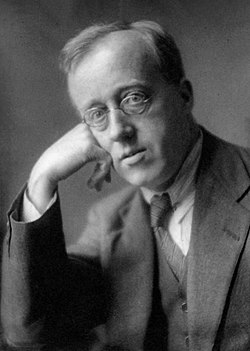| The Perfect Fool | |
|---|---|
| Opera by Gustav Holst | |
 Holst, circa 1921 | |
| Librettist | Gustav Holst |
| Premiere | |
The Perfect Fool is an opera in one act with music and libretto by the English composer Gustav Holst. Holst composed the work over the period of 1918 to 1922. The opera received its premiere at the Covent Garden Theatre, London, on 14 May 1923. Holst had originally asked Clifford Bax to write the libretto, but Bax declined. [1]
Contents
In the score, Holst pokes fun at the works of Verdi, Wagner's Parsifal [2] and Debussy. In the opera, the part of the Fool consists of no singing and only one spoken word, "no." One interpretation of the possible symbolism of the opera, from Donald Tovey, is that the Princess symbolizes the world of opera and the Fool represents the British public. [3]
The opera was not a success, and audiences found the story confusing. [4] Although the opera did receive a live BBC broadcast a year after its premiere, [5] performed by the British National Opera Company and relayed from His Majesty's Theatre, London, [6] [7] revivals of the work have been rare. In 1995, Vernon Handley conducted a performance of the complete opera for the BBC, broadcast on 25 December. [8]
